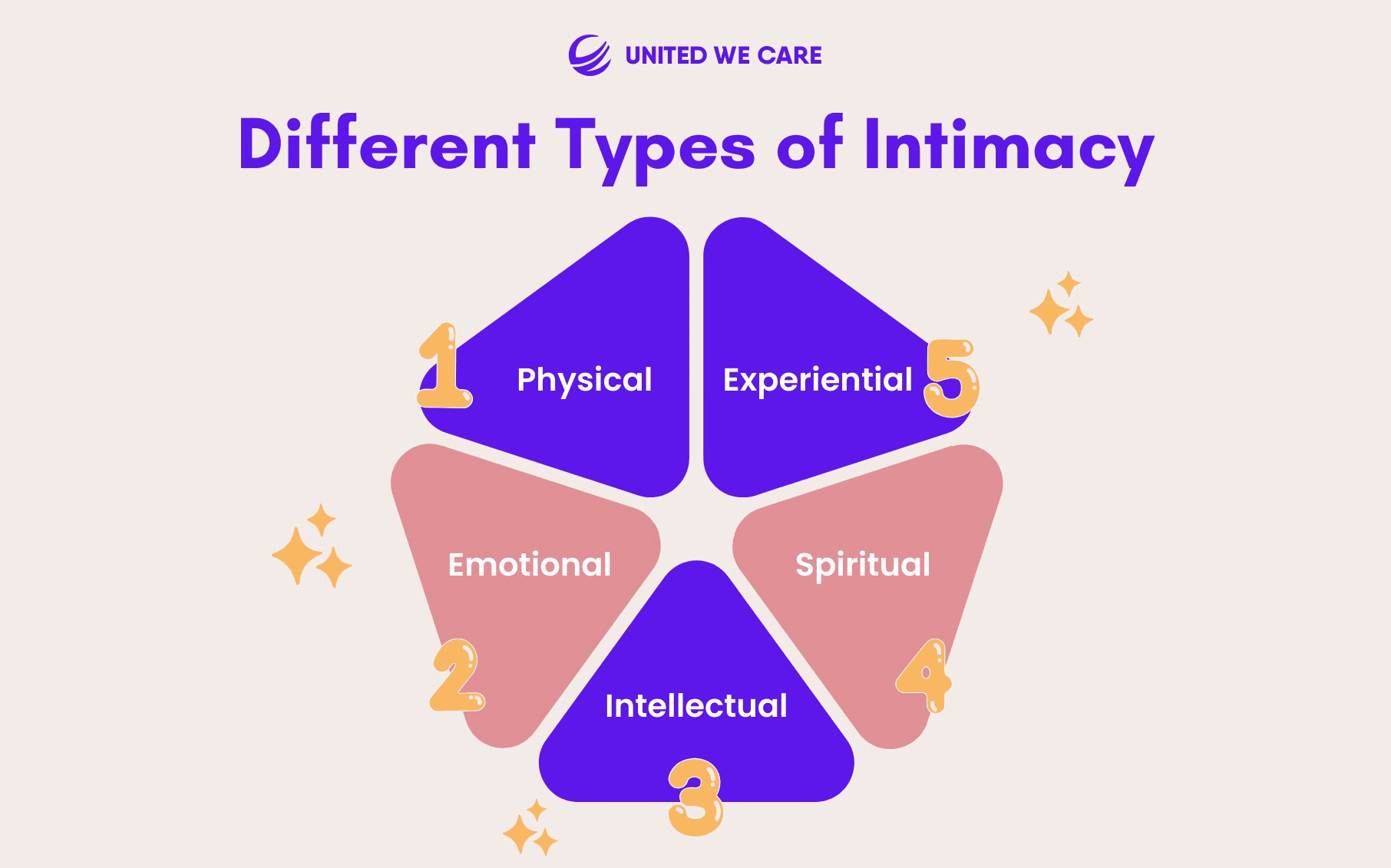Introduction
When relationships begin, they have a spark to them! But as things progress, the real work of developing intimacy begins. Not having intimacy can be frustrating and even isolating for couples. In fact, a relationship without intimacy is like sitting through a movie where actors are just reading out the script. It may have a story, and it may be practical, but it lacks the essence that makes it enjoyable and worth spending time on. If you have been wondering how to cultivate intimacy in your relationships, this article will answer all your questions.
What is Intimacy?
If you take into account the general use of the word intimacy, you might be tempted to consider it a feature of romantic relationships. But sex, romance, and intimacy are quite different. In fact, it is more than possible to have a very intimate relationship with a friend or family member and, on the other hand, have sex without intimacy.
In simple terms, intimacy is the experience of connectedness, bonding, and closeness within relationships [1]. However, it is a very broad concept, and to date, no single definition exists. But this has not stopped psychologists from attempting to define it. For instance, Perlman and Fehr (1981) managed to identify three themes in intimacy: the closeness of partners, the ability to self-disclose safely, and the experience of warmth and affection [2].
In general, intimacy has more to do with being comfortable and vulnerable with your partner (or friend, or even sibling). When you feel close to your partner, are comfortable being your authentic self, and are able to share what you feel or have gone through without the fear of judgment in return, you can term that relationship as intimate. In contrast, when a relationship is ridden with conflict, when communication is breached, or when things like resentment and criticism take root, the relationship is more distant.
Read more about- Emotional affairs.
What are the Different Types of Intimacy?

Intimacy is not a single construct. In fact, sometimes it is an action like holding hands while walking; sometimes it is an experience like cooking together in silence; sometimes an interaction such as sharing a deep secret; and at other times, it is just a characteristic of a relationship. Broadly, intimacy can be divided into 5 types [3] [4]:
- Physical Intimacy: An essential type of intimacy between romantic partners, it involves having sexual relations, kissing, hugging, and other platonic or sexual physical touch.
- Emotional Intimacy: This involves sharing one’s feelings and experiences and trusting that the other will listen and acknowledge you. This component is often quite difficult to attain as many people fear rejection and sometimes even face rejection from their partners.
- Intellectual Intimacy: Intellectual intimacy is where you share your ideas and new concepts with each other and discuss some topics of common interest. This allows the partners to be enthusiastic about the same things and provides a unique chance to understand the worldview of the other.
- Spiritual Intimacy: Spiritual intimacy involves sharing common beliefs and values about things you consider to be important for self-growth and spiritual ascension. While for some, this can include common religion and religious practice, that is not the only form of spiritual intimacy. Things like believing in the same philosophy or practicing yoga or meditation together can also be signs of spiritual intimacy.
- Experiential Intimacy: This is about sharing common past times, doing things together, and sharing experiences with each other. A simple thing as cooking together, even in silence, can be a part of experiential intimacy.
Why is Intimacy Important in a Relationship?
Intimacy can make or break a relationship. Couples therapists know that lack of intimacy is one of the biggest reasons for divorce and breakups [5]. The three main reasons why intimacy becomes important to relationships are:
1) A Component of “Love”: According to the triangular theory of love, intimacy is the common core of love, not only in romantic but all kinds of relationships [6]. Given by Sternberg, this theory talks of three 3 components of love, and one of them is intimacy, which is responsible for driving warmth and trust in a relationship.
2) Health and Well-Being: Good relationships can actually make you healthy both physically and mentally. The reason for this is that intimate relationships provide support and reduce loneliness [2]. Most mental health issues and physical health concerns are worsened without support or with loneliness. Further, day-to-day challenges are handled better when you have someone to share, vent, and seek advice from.
3) Relation Satisfaction: When people have intimate relationships, they are more satisfied with those relationships. Research shows that most types of intimacy affect relationship satisfaction in a positive manner [7].
Must read- Trust in a romantic relationship
What are Some Common Barriers to Intimacy?
There is an intimacy crisis in many relationships, and there are numerous reasons for it. Some common barriers to intimacy include:
1) Difference in Need for Intimacy: Intimacy is a need, but not all people have the same level of it. Some might need higher levels of intimacy to be satisfied, while some might need lower levels [2] [8]. If such an incompatibility exists in the partners, and they are unable to communicate, they will find it difficult to achieve a deeply intimate relationship.
2) Fear of Intimacy: Some people have a fear of being open with anyone. Usually, when people have had negative childhood experiences where their loved ones rejected or shamed them for being vulnerable, they learn that intimacy and closeness are dangerous. Thus, in adulthood, they have a fear of intimacy, and they are unable to make an intimate bond with anyone [9].
3) Demanding Schedule and Priorities: With kids, jobs, financial constraints, and stressful deadlines, many partners realize that intimacy is the first thing to suffer. You may be one of those whose schedule does not allow time for intimacy, and if so, then you are not alone. One of the biggest barriers to intimacy is the demanding schedule of people and their lifestyles.
4) Conflicts and Poor Communication: When criticism, rejection, fights, and hostility are present in the relationship, intimacy will be far away [2]. When partners experience frequent conflicts and cannot communicate their needs to one another, resentment builds in the relationship, and the partners feel distant from each other.
More information about 5 most common relationship problems faced by couples
How can you Cultivate Intimacy in a Relationship?
Many TV series and movies have used this premise: the couple has spent time with each other, but there is hostility, unhappiness, and maybe even infidelity. Eventually, they realize that they still have a love for each other and are able to regain their intimacy. While cultivating intimacy is not that simple in real life, the good news is that you can do it. Some ways you can build intimacy in your relationship are:
1) Start with Reflection: The first step to fixing something is to find the problem. Both you and your partner(s) need to reflect on where the problem arises. Is it at an individual level, such as a fear of intimacy? Is it in your interactions, for instance, you are not able to communicate? Is it situational, that is, maybe your schedules do not allow for intimacy? It might also be that you have an intimate relationship but want to make it stronger. In that case, reflect on what you wish to improve.
2) Schedule Time for Each Other: Intimacy requires some work. Especially when there are scheduling issues, all partners can consciously decide on scheduling time for intimacy. This can include things like scheduling date nights, having one hour of together time each day, and doing any activity (like cooking or cleaning) together while sharing about your lives.
3) Trust and Talk: One way to build more intimacy is to open up to your partner and disclose about yourself. In fact, many consider self-disclosure to be a marker of intimacy. Thus, trusting your partner and sharing what you feel, communicating your needs, or just talking about your past or emotional experience can enhance intimacy.
4) Listen to the Other: Listening is as important as talking. When your partner attempts to communicate, make sure you listen and acknowledge. Listening involves paying attention and understanding what the emotion is behind what your partner is sharing.
5) Explore Couple’s Therapy: Couple’s therapists are experts in the construct of intimacy and in strategies to build it among couples and romantic partners [2] [5]. You might wish to explore some strategies to build intimacy with your partner(s) with a therapist.
Read more about Erotophobia -fear of Intimacy
Conclusion
Intimacy is the thing that makes a relationship warm and affectionate. In many ways, it defines what love is or can be. To lose out on intimacy in any relationship can cause significant disturbance, not only emotionally but also physically. Thus, it becomes important that we cherish intimate relationships and make sure to spend time and effort in strengthening them.
If you are worried about your relationship and wish to understand how you can build intimacy, you can contact our experts at United We Care. At United We Care, the experts are committed to providing you with the best solutions for your overall well-being.
References
[1] J. van Lankveld, N. Jacobs, V. Thewissen, M. Dewitte, and P. Verboon, “The associations of intimacy and sexuality in daily life,” Journal of Social and Personal Relationships, vol. 35, no. 4, pp. 557–576, 2018. doi:10.1177/0265407517743076
[2] D. Perlman, S. Duck, Daniel, and B. Fehr, “The development of intimate relationships,” in Intimate relationships: Development, dynamics, and deterioration, Beverly Hills: Sage Publications, 1987, pp. 13–42
[3] M. T. Schaefer and D. H. Olson, “Assessing intimacy: The pair inventory*,” Journal of Marital and Family Therapy, vol. 7, no. 1, pp. 47–60, 1981. doi:10.1111/j.1752-0606.1981.tb01351.x
[4] S. Nabil, “6 types of intimacy,” Naya Clinics, https://www.nayaclinics.com/post/6-types-of-intimacy (accessed Sep. 20, 2023).
[5] M. Kardan-Souraki, Z. Hamzehgardeshi, I. Asadpour, R. A. Mohammadpour, and S. Khani, “A review of marital intimacy-enhancing interventions among married individuals,” Global Journal of Health Science, vol. 8, no. 8, p. 74, 2015. doi:10.5539/gjhs.v8n8p74
[6] R. J. Sternberg, “A triangular theory of love.,” Psychological Review, vol. 93, no. 2, pp. 119–135, 1986. doi:10.1037/0033-295x.93.2.119
[7] H. Yoo, S. Bartle-Haring, R. D. Day, and R. Gangamma, “Couple communication, emotional and sexual intimacy, and relationship satisfaction,” Journal of Sex & Marital Therapy, vol. 40, no. 4, pp. 275–293, 2013. doi:10.1080/0092623x.2012.751072
[8] C. Dandurand and M.-F. Lafontaine, “Intimacy and couple satisfaction: The moderating role of Romantic attachment,” International Journal of Psychological Studies, vol. 5, no. 1, 2013. doi:10.5539/ijps.v5n1p74
[9] A. L. Vangelisti and G. Beck, “Intimacy and fear of intimacy,” Low-Cost Approaches to Promote Physical and Mental Health, pp. 395–414. doi:10.1007/0-387-36899-x_20










